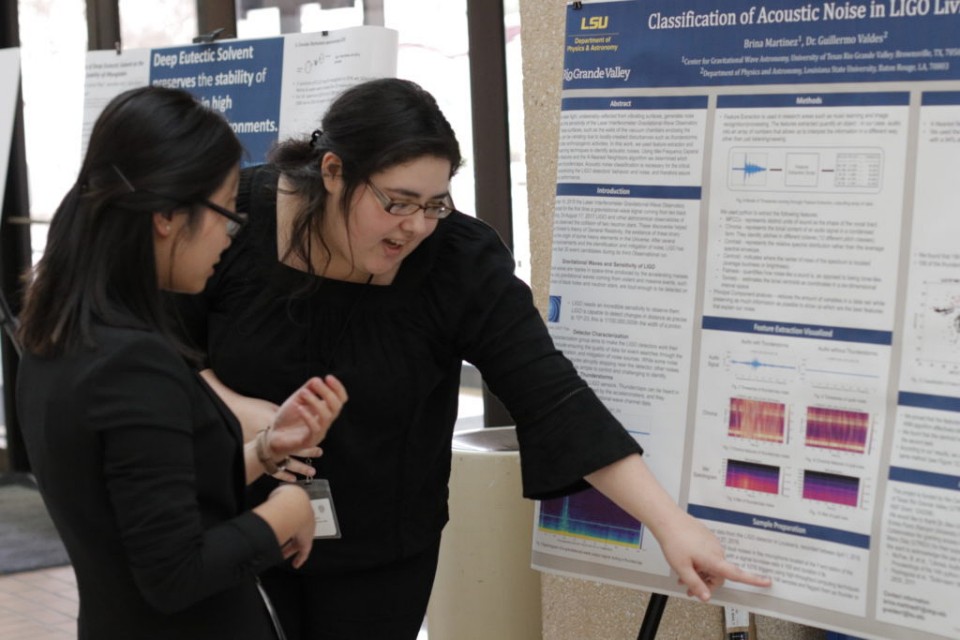Wednesday, February 26, 2020
Research
By News and Internal Communications
By Cinthia Monsivais

RIO GRANDE VALLEY, TEXAS – UTRGV physics undergraduate student Brina Martinez took the “Best Poster” award at the 2020 regional Conference for Undergraduate Women in Physics (CUWiP), hosted at Texas A&M University, College Station.
Funded by the National Science Foundation, the conference, held January 17-19, focuses on helping undergraduate women in physics through experience, resources and information during three-day regional physics conferences held across the country.
“I first heard of the conference through an email from the past president of the Society of Physics Students-Brownsville, Moises Castillo (assistant director of the UTRGV Dr. Cristina V. Torres Memorial Astronomical Observatory in Brownsville),” Martinez said. “I actually applied the day the application was due and about a month later found out I got accepted.”
It was at her first CUWiP at Texas A&M University-Corpus Christi in 2019 that Martinez found inspiration for the research poster that earned her the “Best Poster” award this year. That’s where she met Dr. Gabriela Gonzalez, a scientist at the Laser Interferometer Gravitational-Wave Observatory in Livingston; from that moment, she knew she wanted to work with LIGO.
“My poster displayed the research I did with the LIGO collaboration over the previous summer,” she said. “I worked on a code that would be able to classify an acoustic noise from thunderstorms, which would help locate which part of the LIGO detector was being most affected. My poster included background information on what LIGO is, how my research worked and the results I concluded.”
Through research, development and data analysis during her time at the LIGO national facility in Livingston, she was able to create a draft for her poster throughout the summer, which she used to update her final presentation.
The poster was titled “Classification of Acoustic Noise in LIGO Livingston,” and Martinez made sure to include definitions and images that would help viewers follow the process of her research.
“In this work, we used feature extraction and machine learning techniques to identify acoustic noises. Using Mel-Frequency Cepstral Coefficient features and the K-Nearest Neighbors algorithm we determined which sounds were thunderclaps,” Martinez said in her poster abstract. “Acoustic noise classification is necessary for the critical task of characterizing the LIGO detectors’ behavior and noise, and therefore assure their correct performance.”
Throughout the poster presentation session, the judges traveled around the room asking questions of the presenters and judging the clarity of the content.
Being one of the four winners of the poster competition has given Martinez a new sense of confidence as a student researcher that she admits she had struggled to find before.
She said it feels good to know that all of her hard work paid off.
“There were so many other great posters, and I’m glad I was a winner,” Martinez said. “I am hard on myself a lot of the time, so winning this award helped me know I am doing something good. I even got a free subscription to a math software, which comes in handy.”
PLANNING AHEAD
Martinez plans to continue her research and wants to present posters at other conferences. She also hopes to participate at next year’s CUWiP in her last year as an undergraduate.
“I would love to compete at this conference once more before graduating,” Martinez said. “I believe that this conference is very beneficial for women and minorities who might not always have the resources for more information.”
Martinez said she plans to continue her research with the LIGO Scientific Collaboration and will pursue graduate school.
“I aim to go as far as I can with my degree in physics,” Martinez said. “With the year I have left as an undergraduate at UTRGV, I plan to continue doing outreach, research and advance in my studies with physics and computer science.”
ABOUT UTRGV
The University of Texas Rio Grande Valley (UTRGV) was created by the Texas Legislature in 2013 as the first major public university of the 21st century in Texas. This transformative initiative provided the opportunity to expand educational opportunities in the Rio Grande Valley, including a new School of Medicine and a School of Podiatry, and made it possible for residents of the region to benefit from the Permanent University Fund – a public endowment contributing support to the University of Texas System and other institutions.
UTRGV has campuses and off-campus research and teaching sites throughout the Rio Grande Valley including Brownsville (formerly The University of Texas at Brownsville campus), Edinburg (formerly The University of Texas-Pan American campus), Harlingen, Weslaco, McAllen, Port Isabel, Rio Grande City and South Padre Island. UTRGV, a comprehensive academic institution, enrolled its first class in the fall of 2015; the School of Medicine welcomed its first class in the summer of 2016, and the School of Podiatric Medicine in the fall of 2022.
